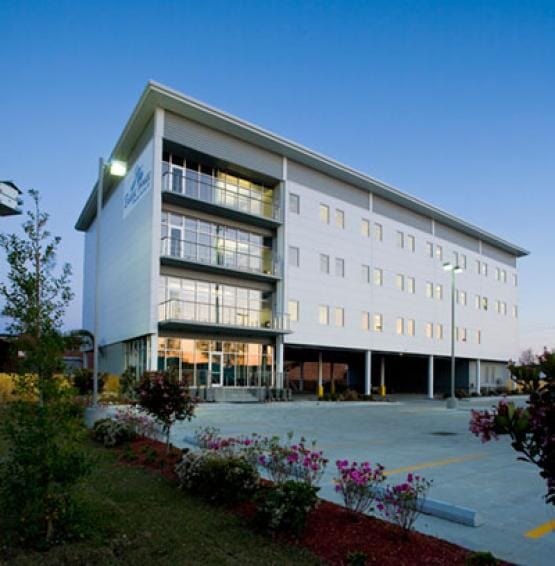Through its long-term residential treatment program, Bridge House offers residents seeking recovery the time needed to become sober and productive individuals again. The Bridge House treatment program, which is based on the disease concept of addiction, is intensive and highly structured. Residents reside in a dormitory setting and progress through several phases of treatment: stabilization, primary, independent living and aftercare.
ABOUT BRIDGE HOUSE ― Men’s Treatment Program
Opened in 1957, Bridge House in New Orleans has transitioned from a temporary shelter to a long-term substance abuse treatment center, offering adult men the resources and structure they need to achieve sobriety. Grace House, a separate facility run by the same organization, provides substance abuse treatment for women.
TREATMENT & ASSESSMENT
Treatment is based on an individualized treatment plan. Treatment duration depends on the individual client’s needs, but most residents remain on-site for six months. Treatment is gender-specific and vocation-based. Programming is based on the disease concept of addiction and the therapeutic community model and is divided into three phases: stabilization, primary, independent living, and aftercare.
During the stabilization period, residents adjust to the highly-structured program and become familiar with the routines of the house. This lasts for the first 14 to 30 days of the program and consists of 20 hours or more per week. In the primary phase, clients work with both clinical and vocational staff to learn the skills necessary for sustained recovery.
In the final phase of treatment, clients move into permanent housing but continue to return to the center for group and individual therapy. They gain employment or pursue vocational training.
STAFF CREDENTIALS
Bridge House’s leadership team includes a licensed clinical social worker and licensed addiction counselor. The staff also includes program graduates.
ACCOMMODATIONS & AMENITIES
During their treatment, clients stay in dormitory-style residences in a three-story building with a balcony on each floor. Clients are supervised 24/7. Those surveyed by Best-rehabs.com provided three out of five stars or higher for accommodations, cleanliness, and meals.
WHAT ALUMNI SAY
At the time of this writing, four alumni submitted feedback to Best-rehabs.com for Bridge House. It was positive.
Alumni gave four- and maximum five-star ratings for treatment effectiveness. Alumni credited the program with their long-term sobriety. Alum G.D., the sole alum polled on the following metrics, gave the level of staff support, the quality of group and individual therapy, and quality of the lead counselors each five out of five stars.
Alumni didn’t agree on the quality of the holistic offerings, with one alum offering just two stars and another offering four stars. Alum Scott wrote:“Bridge house claimed to have a gym but I never seen a gym when I was there.” Several alumni also thought the rehab’s policy on connection with those outside the facility could be improved.
On CiteHealth, reviews of the facility are mixed, with two one-star ratings and one five-star rating. [1] One anonymous reviewer who left negative feedback wrote that “This program did not address core issues. It did not involve or contact family.”
WHAT FRIENDS & FAMILY SAY
To date, one loved one submitted feedback to Best-rehabs.com.
R., the parent of an alum, expressed concern over hidden costs and wrote: “This is supposed to be a free rehab, and it’s costing us over $400 a month to have our child there…We have to provide 40-50$ a month for bus fare! I’m regretting this decision more every day!”
FINANCING
The center’s website notes that treatment is provided regardless of one’s ability to pay, and some alumni surveyed by Best-rehabs.com reported receiving free treatment.
[1] http://citehealth.com/rehab-centers/louisiana/cities/new-orleans/bridge-house-inc
